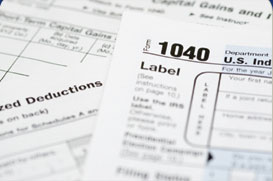
(760) 765-0343

Record Retention Guide for Individuals
Good recordkeeping can cut your taxes and make your financial life easier.
How long to keep records is a combination of judgment and state and federal statutes of limitations. Since federal tax returns can generally be audited for up to three years after filing and up to six years if the IRS suspects underreported income, it�s wise to keep tax records at least seven years after a return is filed. Requirements for records kept electronically are the same as for paper records.
Generally, follow these recommended retention periods for various documents:
How long to keep records is a combination of judgment and state and federal statutes of limitations. Since federal tax returns can generally be audited for up to three years after filing and up to six years if the IRS suspects underreported income, it�s wise to keep tax records at least seven years after a return is filed. Requirements for records kept electronically are the same as for paper records.
Generally, follow these recommended retention periods for various documents:
| Record | Retention Record |
| Tax returns (uncomplicated) | 7 years |
| Tax returns (all others) | Permanent |
| W-2s | 7 years |
| 1099s | 7 years |
| Cancelled or substitute checks supporting tax deductions | 7 years |
| Bank deposit slips | 7 years |
| Bank statements | 7 years |
| Charitable contribution documentation | 7 years |
| Credit card statements | 7 years |
| Receipts, diaries, logs pertaining to tax returns | 7 years |
| Investment purchase and sales slips | Ownership period + 7 years |
| Dividend reinvestment records | Ownership period + 7 years |
| Year-end brokerage statements | Ownership period + 7 years |
| Mutual fund annual statements | Ownership period + 7 years |
| Investment property purchase documents | Ownership period + 7 years |
| Home purchase documents | Ownership period + 7 years |
| Home improvement receipts and cancelled checks | Ownership period + 7 years |
| Home repair receipts and cancelled checks | Warranty period for item |
| Retirement plan annual reports | Permanent |
| IRA annual reports | Permanent |
| IRA nondeductible contributions (Form 8606) | Permanent |
| Insurance policies | Life of policy + 3 years (Check with your agent. Liability for prior years can vary.) |
| Divorce documents | Permanent |
| Loans | Term of loan + 7 years |
| Estate planning documents | Permanent |
Julian Office: 4367 Highway 78, Ste. 112, Santa Ysabel, CA 92070 (760) 765-0343 (760) 765-0150 Fax
San Diego Office: (By Appointment Only) 3751 37th St., #2, San Diego, CA 92105 (619) 283-7113 (619) 284-7113 Fax
Correspondence: P.O. Box 1934, Julian, CA 92036 E-mail: rebecca(at)luerscpa.com jan(at)luerscpa.com
San Diego Office: (By Appointment Only) 3751 37th St., #2, San Diego, CA 92105 (619) 283-7113 (619) 284-7113 Fax
Correspondence: P.O. Box 1934, Julian, CA 92036 E-mail: rebecca(at)luerscpa.com jan(at)luerscpa.com



© 2010 Luers & Dyer, CPA, LLP. All Rights Reserved.


Website Design: été advertising & design